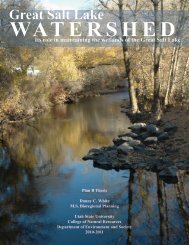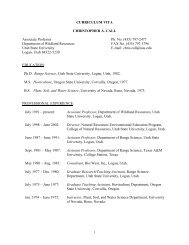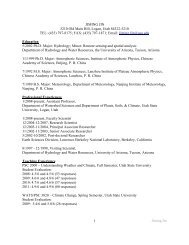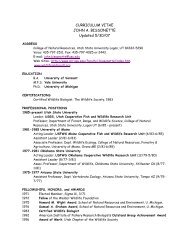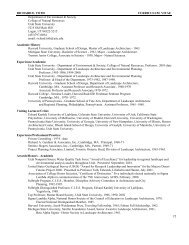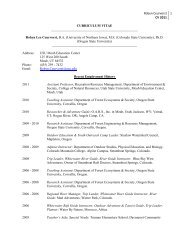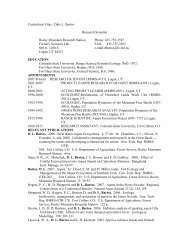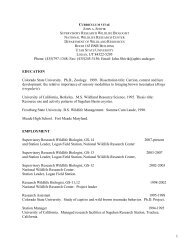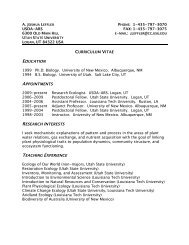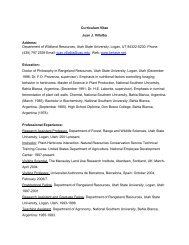University Education in Natural Resources - CNR Home - Utah State ...
University Education in Natural Resources - CNR Home - Utah State ...
University Education in Natural Resources - CNR Home - Utah State ...
You also want an ePaper? Increase the reach of your titles
YUMPU automatically turns print PDFs into web optimized ePapers that Google loves.
1998<br />
<strong>University</strong> <strong>Education</strong> <strong>in</strong> <strong>Natural</strong> <strong>Resources</strong> 107<br />
• Participants felt they learned more from their peers <strong>in</strong> this<br />
course than <strong>in</strong> other courses, largely because of the ease with<br />
which complex <strong>in</strong>formation can be shared us<strong>in</strong>g the Web.<br />
• Personal <strong>in</strong>teraction is needed to build a sense of community<br />
among participants before they will buy <strong>in</strong>to Web-based<br />
collaboration.<br />
• Face-to-face <strong>in</strong>teraction was more highly valued than Web<br />
<strong>in</strong>teraction for bra<strong>in</strong>storm<strong>in</strong>g and br<strong>in</strong>g<strong>in</strong>g complex issues to<br />
closure.<br />
Expectation<br />
The Web will enhance our ability to br<strong>in</strong>g<strong>in</strong>g diverse stakeholders<br />
to the table.<br />
What we learned (7 participants)<br />
No.<br />
• Some stakeholders agree to participate, but none did.<br />
• Failure to participate attributed to lack of time and concern<br />
about voic<strong>in</strong>g op<strong>in</strong>ions on controversial issues on an open<br />
Web site.<br />
• Personal <strong>in</strong>teraction is needed to build a sense of community<br />
before stakeholders will buy <strong>in</strong> to Web-based collaboration.<br />
• Provid<strong>in</strong>g restricted access forums might <strong>in</strong>crease participation.<br />
Our reshaped vision<br />
• A group of motivated, experienced graduate students from<br />
multiple discipl<strong>in</strong>es, collaborat<strong>in</strong>g with us as peers.<br />
• First build community identity among participants through<br />
face-to-face meet<strong>in</strong>gs when possible, and Web-based<br />
conferenc<strong>in</strong>g technology if participants are scattered geographically.<br />
• Migrate to Web <strong>in</strong>teraction as participants become more<br />
comfortable with one another.<br />
• Use the Web’s text and image based tools for <strong>in</strong>-depth analyses<br />
and considered responses.<br />
• Provide a mixture of secure and open forums to reduce <strong>in</strong>timidation<br />
and <strong>in</strong>crease probability of stakeholder participation.<br />
• Form teams <strong>in</strong> response to common <strong>in</strong>terests, geographic<br />
proximity, and schedul<strong>in</strong>g realities.<br />
• Schedule progress meet<strong>in</strong>gs with <strong>in</strong>dividual students, either<br />
<strong>in</strong> person or us<strong>in</strong>g a video l<strong>in</strong>k.<br />
allowed us to enter complete citation <strong>in</strong>formation and notes<br />
for all the literature we read. As citations were entered, the<br />
software created a citation <strong>in</strong>dex. Us<strong>in</strong>g this system participants<br />
could discover what everyone was learn<strong>in</strong>g as soon as<br />
citations were entered. Web-savvy participants were soon<br />
putt<strong>in</strong>g hyperl<strong>in</strong>ks to bibliographic entries <strong>in</strong> their written<br />
submissions and NetForum post<strong>in</strong>gs. The students had several<br />
suggestions for improv<strong>in</strong>g the bibliographic software, most<br />
of which were implemented dur<strong>in</strong>g the early weeks of the<br />
course. With our guidance, staff members from the North<br />
Carol<strong>in</strong>a <strong>State</strong> <strong>University</strong> Libraries are currently enhanc<strong>in</strong>g<br />
the software to <strong>in</strong>clude edit, search, and other capabilities.<br />
Once improved, this software has potential for wide application<br />
<strong>in</strong> collaborative research projects.<br />
Intimidat<strong>in</strong>g Forum — Cannot Retract <strong>State</strong>ments<br />
As part of the first phase, we began a NetForum discussion<br />
about the def<strong>in</strong>ition of clearcutt<strong>in</strong>g. Students are accustomed<br />
to writ<strong>in</strong>g for the <strong>in</strong>structor alone, and some <strong>in</strong> the class were<br />
<strong>in</strong>timidated by the prospect of expos<strong>in</strong>g their ideas to classmates<br />
and Web surfers at large <strong>in</strong> such a public forum. Given<br />
time for adjustment, we feel this is a positive force that will<br />
drive students to put more thought and effort <strong>in</strong>to their work.<br />
For our course, it unfortunately meant that several participants<br />
were largely silent <strong>in</strong> NetForum discussions.<br />
This phenomenon was not limited to student participants, but<br />
expla<strong>in</strong>s partly the lack of stakeholder participation. We approached<br />
people from several environmental organizations and<br />
forest products companies about participat<strong>in</strong>g <strong>in</strong> our course.<br />
We pitched it as an opportunity to educate an open-m<strong>in</strong>ded<br />
group about the role of clearcutt<strong>in</strong>g <strong>in</strong> forest management<br />
and the environment. Most of those we approached expressed<br />
<strong>in</strong>terest, and two were enthusiastic enough to agree to participate.<br />
In the end not one stakeholder jo<strong>in</strong>ed <strong>in</strong>, despite our<br />
attempts to make participation as easy as possible. This was<br />
a great disappo<strong>in</strong>tment to our students who viewed stakeholder<br />
participation as an excellent way to br<strong>in</strong>g a “real world” perspective<br />
to our analyses. After the course was over, we learned<br />
that failure to participate was due <strong>in</strong> part to concern among<br />
stakeholders about voic<strong>in</strong>g op<strong>in</strong>ions on controversial and sensitive<br />
issues on an open Web site.<br />
Our demand that post<strong>in</strong>gs conta<strong>in</strong> appropriate citations further<br />
<strong>in</strong>creased anxiety about the process. This requirement<br />
was a two-edged sword. It reduced the number of post<strong>in</strong>gs,<br />
but it generally <strong>in</strong>creased the quality of the post<strong>in</strong>gs that were<br />
made. Several early post<strong>in</strong>gs were heavily documented and<br />
well reasoned and set a standard that some participants felt<br />
they could not meet; the reaction of some was to withdraw<br />
from discussions. Based on the level and quality of our one<br />
Ph.D. student’s participation, we suspect this would have been<br />
less of a problem had we attracted the group of Ph.D. students<br />
we <strong>in</strong>itially envisioned. Nevertheless, we feel that quality<br />
is more important than quantity and will ma<strong>in</strong>ta<strong>in</strong> the citation<br />
requirement <strong>in</strong> future course offer<strong>in</strong>gs of this type.<br />
Several “flames” — a term used to describe <strong>in</strong>flammatory<br />
statements sent by electronic mail or list servers — from outside<br />
readers re<strong>in</strong>forced feel<strong>in</strong>gs of <strong>in</strong>timidation. We encouraged<br />
the students to respond <strong>in</strong> a reasoned manner or to ignore<br />
“flames,” but to avoid <strong>in</strong>volvement <strong>in</strong> “flame wars.” The<br />
negative comments petered out quickly. We might have<br />
avoided this problem by <strong>in</strong>stall<strong>in</strong>g security features, but we<br />
had made a conscious decision not to do so because we wanted<br />
to expose participants to varied perspectives. However, lack<br />
of security hampered open discussion among our students and<br />
between students and stakeholders. In the future, we may




